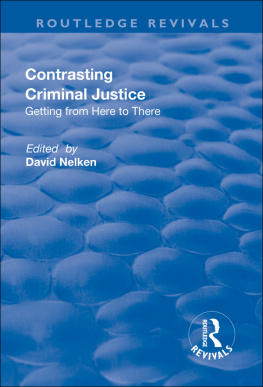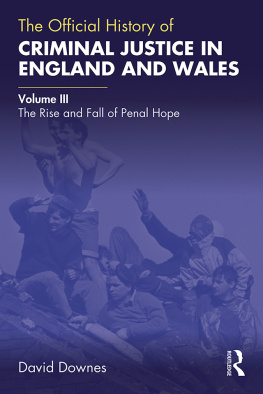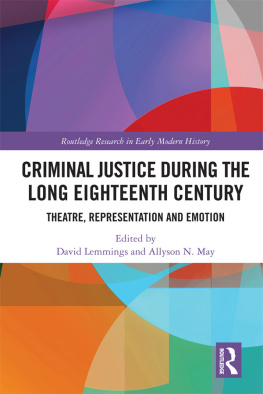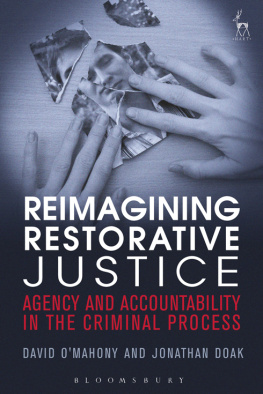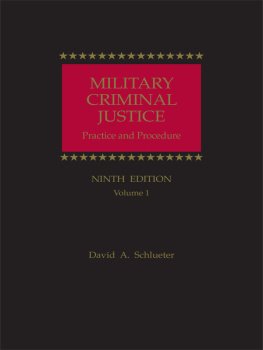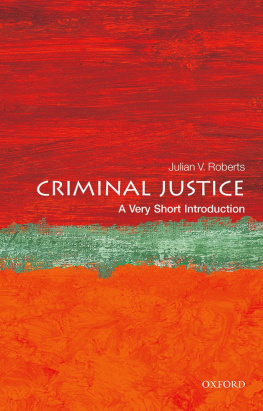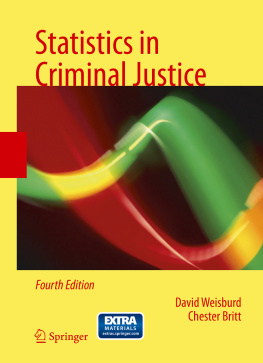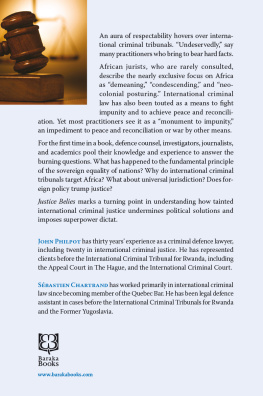Contrasting Criminal Justice
For Matilde, Rachel, Miriam, Mical and Gavriel: Here and There
Advances in Criminology
Series Editor: David Nelken
Titles in the Series
Engendering Resistance: Agency and Power in Womens Prisons
Mary Bosworth
Integrating a Victim Perspective within Criminal Justice International debates
Edited by Adam Crawford and Jo Goodey
Gender Criminology Violence and women in Australia and Japan
Patricia Easteal, Yoko Hosoi and Leon Wolff
Contrasting Criminal Justice Getting from here to there
Edited by David Nelken
Critique and Radical Discourses on Crime
George Pavlich
Blood in the Bank Social and legal aspects of death at work
Gary Slapper
Governable Places Readings on governmentality and crime control
Edited by Russell Smandych
Items Stories of product counterfeiting
Jon Vagg and Justine Harris
First published 2000 by Dartmouth Publishing Company and Ashgate Publishing
Reissued 2018 by Routledge
2 Park Square, Milton Park, Abingdon, Oxon OX14 4RN
711 Third Avenue, New York, NY 10017, USA
Routledge is an imprint of the Taylor & Francis Group, an informa business
Copyright David Nelken 2000
All rights reserved. No part of this book may be reprinted or reproduced or utilised in any form or by any electronic, mechanical, or other means, now known or hereafter invented, including photocopying and recording, or in any information storage or retrieval system, without permission in writing from the publishers.
Notice:
Product or corporate names may be trademarks or registered trademarks, and are used only for identification and explanation without intent to infringe.
Publishers Note
The publisher has gone to great lengths to ensure the quality of this reprint but points out that some imperfections in the original copies may be apparent.
Disclaimer
The publisher has made every effort to trace copyright holders and welcomes correspondence from those they have been unable to contact.
ISBN 13: 978-1-138-72219-4 (hbk)
ISBN 13: 978-1-315-19377-9 (ebk)
Marie-Andree Bertrand
is Professor Emeritus of Criminology at the University of Montreal, Canada.
Chrisje Brants
is Professor of Criminal Law and Criminal Procedure at the University of Utrecht.
Maureen Cain
is Reader in the Sociology of Law and Crime, Faculty of Law, University of Birmingham.
Adam Crawford
is Senior Lecturer in Law and Deputy Director of the Centre for Criminal Justic Studies, University of Leeds, UK.
Johannes Feest
is Professor of Criminal Law at the University of Bremen, Germany.
Stewart Field
is Lecturer in Law at the University of Wales at Cardiff.
David T. Johnson
is Assistant Professor of Sociology at the University of Hawaii at Manoa, USA.
Jacqueline Hodgson
is Lecturer in Law at the University of Warwick, UK.
Masayuki Murayama
is Professor of Sociology of Law in the Department of Law, Chiba University, Japan.
David Nelken
is Distinguished Professor of Sociology at the University of Macerata, Italy and Distinguished Research Professor of Law at the University of Wales at Cardiff.
This series, building on the success of the International Library of Criminology, Criminal Justice and Penology is dedicated to publishing the best of new cutting-edge work in these fields. Volumes published or in preparation include theoretically innovative treatments of the subjects of Foucault and governmentality; mediation; victimology; comparative criminal justice; post-modern policing; and womens prisons.
The contributors to Contrasting Criminal Justice tackle a variety of issues raised by research into criminal justice in other cultures. How far does criminal justice reflect general culture? Can collaborative research overcome the problem of translating incommensurable concepts? What are the possibilities for virtual comparisons? How do we tell difference? The authors, who are drawn from a wide variety of countries, offer penetrating and sometimes disturbing reflections on international differences in processes of trial and punishment.
DAVID NELKEN
Series Editor
Part I
Introduction
1
Just Comparing
David Nelken
The contributors to this volume all of whom work in thefieldof comparative criminal justice were asked to provide examples of their research which gave special attention to the methods by which they arrived at their findings. The chapters they have supplied are full of interest, but they need some presentation if this collection is to be more than the sum of its parts. In the first of these introductory chapters I shall therefore try to demonstrate why there is a need for better reflection on the aims, issues and methods of comparative criminal justice and in the next chapter I shall concentrate on the principal questions of epistemology and research method which have shaped the organization of this volume, seeking to show how they influence the interplay between substance and method in each of the chapters.
Even the best of current English-language theorizing about crime control takes much of its sense and point from background assumptions and developments which are most at home in what Europeans term Anglo-American culture. David Garlands important and influential analysis of the way the state is currently seeking to divest at least part of its responsibilities in this sphere (Garland, 1996) has less application in the state-centred societies of Continental Europe where, in some respects, it is only now that the states responsibility to protect its citizens from street crime is becoming a top priority. Much the same can be said for many of the main arguments in Jock Youngs eloquent analysis of what he calls the exclusive society (Young, 1999). Despite the many similarities at the level of practice brought about by the homogenizing and converging influences of the European Union, the debate about solidarity versus exclusion takes rather different forms depending on whether it is the representatives of the state or the members of civil society who are allocated the main role in creating an integrated sense of identity and community. If penality is so much a matter of cultural meaning and not merely of instrumental effectiveness (Garland, 1990) it is obvious that this will vary from culture to culture. Indeed, it is fair to say that many of the important points made by these leading scholars are comparative observations about the similarities and the differences they notice in comparing Britain and the USA.
At the same time there is increasing interest in exploring wider differences in criminal justice, especially, but not only, with respect to other member countries of the European Union. There are now many valuable monographs on different aspects of the criminal process, in this volume; Nelken, 1994b; Zedner, 1995, 1996), or Foucauldian (Smandych, 1999). But the standard texts in comparative criminal justice still tend to invite experts from different countries to provide national reports, rather than get them to address what lies behind their descriptions and interpretations which is, in any case, a difficult task to undertake without the experience of collaboration or research in different countries. With rare exceptions, even recent collections contain relatively little about the actual process of carrying out cross-cultural research in criminal justice (see, for example, Dorn

